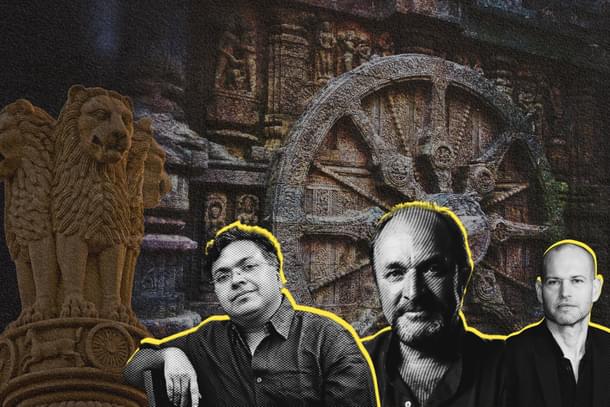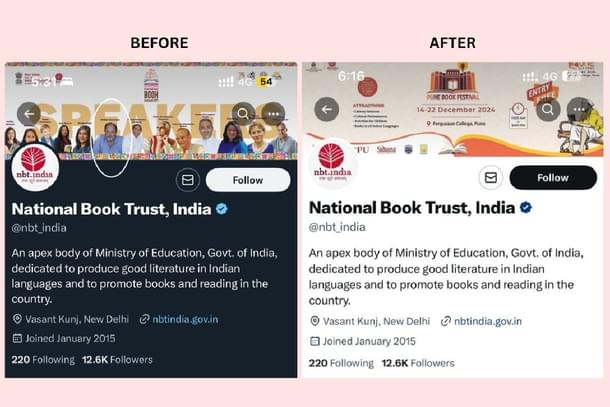Culture
End The Self-Sabotage: Government Must Stop Lending Credibility To Detractors Of India And Hindus
Anmol N Jain
Dec 02, 2024, 08:45 PM | Updated May 30, 2025, 08:13 PM IST
Save & read from anywhere!
Bookmark stories for easy access on any device or the Swarajya app.


Ahmedabad International Book Festival (AIBF) 2024 has yet again revealed a troubling trend that has plagued the incumbent government over the past decade - failure to vet the guests they invite for various functions, festivals, and programmes.
Organized by the Ahmedabad Municipal Corporation (AMC) in collaboration with the Union Education Ministry and the National Book Trust (NBT), AIBF has invited speakers and authors who mock Hindus, are frequent apologists for Mughals and Islamic invaders, work to de-platform inconvenient authors and their works, propagate doubts on EVMs, engage in faux-secularist propaganda, and have nothing but contempt for the present government.
These invitees include William Dalrymple, Savie Karnel, and Kiran Manral. Dalrymple, a known Hindutva critique had pursued the publishing house Bloomsbury to withdraw the book ‘Delhi Riots 2020: The Untold Story’ written by Monika Arora, Prerna Malhotra, and Sonali Chitalkar. The book was later published by Garud Prakashan.
“I went there and was saddened to see the poster of White Supremacist William Dalrymple yesterday. He pushed Bloomsbury to call off the book on Delhi Riots 2020. He doesn’t think Hindu women’s lived experiences should be described and his associates described those experiences as ‘state propaganda’. If he de-platforms others then de-platforming him becomes my Dharma and I am doing my duty here,” says Harshil Mehta who has been calling out the invitation on social media.
“Last year, he appealed to Britain not to return stolen artefacts because a Hindutva government is ruling India. Who is he to question the democratic choices of Indian people and opine on behalf of us?” he continued.
Savie Karnel, another guest, is the author of the book ‘The Nameless God’ which is set in the backdrop of Babri demolition and peddles the usual faux-secularism.
One scroll through writer Kiran Manral’s X profile is enough to understand her support for the problematic narratives against EVMs. Along with the hoax that EVM could be “unlocked using phones”, she also shared stories calling India’s response to COVID pandemic “slow, blunt, and callous”, the inauguration of new Parliament an “elaborate mimicry” which “displayed the sham that is New India”, that the “renewed Hindutva resurgence” is making “women more vulnerable”, and mocking the lighting of lamps in Ayodhya.
It is baffling that a simple web search or even surface level awareness would reveal these things about the invitees. And still, one or the government department keeps falling short.
Sources suggest that while AMC used to organise Ahmedabad Book Fetsival as local fest every year, this year National Books Trust under the Union Education Ministry was roped in to make it an 'international' festival. It was NBT which was given the charge to curate speakers for the event.
In fact the header picture of NBT's X account featured the lineup of speakers which following the outrage was changed.

The AIBF debacle is not an isolated case. This reflects a recurring lapse in judgment across various government-sponsored events. How does it happen again and again? Ten years in power and the government still seems clueless.
Only a few days back Sahitya Akademi (an autonomous body under the Union Ministry of Culture) had organised a seminar titled ‘Indian Mythology: Memory, Retellings and Translations’ where Devdutt Pattanaik was invited to give the inaugural address on 25th November 2024.
Labelling Indian ‘itihas’ (history) as mythology aside, inviting a patently anti-Hindu and serial abuser of Devi-Devtas and Sanatan Dharma, betrays the casual approach that has become regular with the government events. It was only after social media outrage that the seminar was cancelled citing “unavoidable circumstances”.
It was not the first time though. In 2022, Pattanaik was invited for a session at the National Youth Festival held in Puducherry. After several netizens called out the development, the session’s broadcast was cancelled. The reason cited was "unforeseen technical issues".
In the same year, there was the fiasco at the International Film Festival of India (IFFI) in Goa. The festival is organised jointly by the National Film Development Corporation of India (under the Ministry of Information and Broadcasting) and the state Government of Goa.
Nadav Lapid, an Israeli filmmaker who is a known Islamic terror apologist, was appointed as the IFFI Jury Head. Lapid then ended up describing ‘The Kashmir Files’ as "vulgar" and "propaganda" on stage with the then Minister of Information and Broadcasting Anurag Thakur in the audience.
The instances of this casual indifference are many — from AYUSH Ministry recently calling Yoga a 'glow up ritual' diluting it from its Hindu spiritual origins to Ira Trivedi, known for advocating the consumption of beef, hosting a Yoga show on national broadcaster Doordarshan.
The ministries of Culture and Education have been the most disappointing in this regard.
Despite being in power for a decade, the government has failed to update biased NCERT textbooks or address the continued apologia for Mughal rulers perpetuated by the Archaeological Survey of India (ASI) website which still features Taj Mahal as the gateway to "Experiencing World Heritage" in India.
This consistent failure to align with public sentiment suggests a disconnect between the government’s outreach strategies and the cultural aspirations of its base. By providing platforms to individuals whose narratives directly contradict the values and ethos of India, the government risks alienating its supporters while emboldening its critics.
What makes these instances particularly concerning is the lack of accountability. Each controversy, rather than being a wake-up call, seems to repeat with little introspection. The result is a growing perception that the government’s cultural policies lack coherence and vision, raising questions about its ability to represent the majority's aspirations effectively.
The frequency of these lapses is deeply concerning, pointing to a systemic issue rather than isolated incidents. The lackadaisical attitude of officials tasked with organising such events raises serious questions about accountability and competence.
What’s even more frustrating is the absence of consequences for such blunders. No official is reprimanded, no processes are overhauled, and the same mistakes are repeated, often with greater repercussions. This culture of impunity fosters complacency, allowing damaging narratives to proliferate unchecked. The persistence of these oversights is bound to have long-term consequences.
How long do we want to keep fighting the battle of base-psyche?
What's happening at AIBF is an indicator of a deeper rot, of criminal negligence, and of suicidal indifference.
What the powers that be forget is that the window they have is not unlimited. Sooner or later it will shut. The swifter and deeper you implement these changes, the more embedded will they be in the psyche of the coming generation of Indians. What they see now is what will stay with them forever. Be it the textbooks, litfests, government programmes, websites, film fests, cultural programmes — all of these matter in equal measure.
The impact on the collective psyche is that the younger generation, often influenced by intellectual and cultural elites, begin to internalise narratives that undermine their heritage and history. This disconnect from tradition leaves future generations rootless as many have been rendered so in the past. How hard it is to course-correct is well-known.
Any laxity here is suicidal and will result in generations growing up with the same left-liberal-Islamist bias that the previous generations have imbibed.
When platforms funded by the state and trusted by the people are used to promote distorted narratives, they chip away at the general consensus of society. How long do we want to keep fighting the battle of base-psyche? If we're still stuck at that, when will we build upon it?
So what can be done? It is imperative to address this recurring issue with a structured approach.
Instead of relying solely on bureaucrats or officials, who may lack cultural insight, ideological clarity, or even motivation, each department and ministry should attach a group of advisors from the ecosystem that aligns with the values and aspirations. These individuals, drawn from academia, literature, cultural spheres, social media can act as gatekeepers to ensure that such platforms are safe from distorted agendas.
There is also a need to establish clear accountability for such lapses. Officials who repeatedly fail to perform due diligence should face repercussions.
Also, it is not merely about avoiding embarrassment. The current trajectory risks alienating the nationalists and supporters of Indian values while creating a perception that the state has a troubling inclination to placate and seek validation from ideologically hostile quarters, emboldening those who seek to distort India’s cultural and historical narratives.
It is crucial for the government to introduce a structured vetting process that incorporates cultural and ideological expertise.
If this cycle of poor vetting and misplaced priorities continues, the government risks losing the cultural and ideological mandate it has worked so hard to build.
Anmol N Jain is a writer and lawyer with a background in International Relations, Political Science, and Economics. He posts on X at @teanmol.




